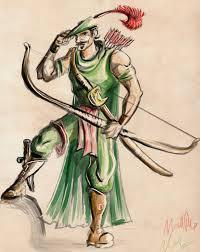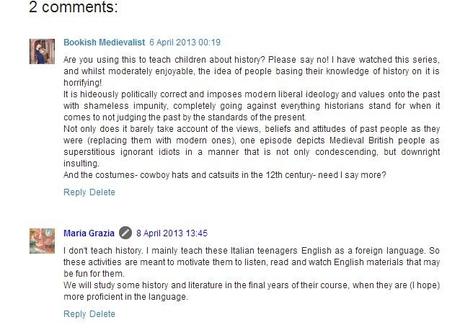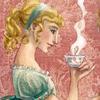 Those of you who have been following my activity online for a while, are well acquainted with the fact that I am a teacher, that I love my job, that I also run a blog for my students and what I usually do is teaching English as a foreign language or English Literature to Italian students. What I want to share and discuss with you today is something which happened to me on LearnOnLine, after posting a lesson with video clips taken from BBC Robin Hood, addressed to a group of 15-year-old students to whom I teach grammar and language, as well as to a second group of 16-year-old students to whom I teach grammar and language but also "pills" of literature (from the origins to the Elizabethan Age).
Those of you who have been following my activity online for a while, are well acquainted with the fact that I am a teacher, that I love my job, that I also run a blog for my students and what I usually do is teaching English as a foreign language or English Literature to Italian students. What I want to share and discuss with you today is something which happened to me on LearnOnLine, after posting a lesson with video clips taken from BBC Robin Hood, addressed to a group of 15-year-old students to whom I teach grammar and language, as well as to a second group of 16-year-old students to whom I teach grammar and language but also "pills" of literature (from the origins to the Elizabethan Age).
 It was not the first time I used those materials, as I usually don't teach my younger students literature or history in a very academic way. My approach is rather focused on what teenagers may like more than on the accuracy of information (which I respect as much as I can). I may be wrong, but this is what I generally do. They are not really interested in sound devices or rethoric figures at their age, they hate being forced to memorize facts and dates which they consider useless. They do like stories, legends, heroes and myths. They also like when the lesson is not merely listening to the teacher speaking or reading in front of them. That is why I use videos and music, multimedia tasks and sources quite often in my lessons.
It was not the first time I used those materials, as I usually don't teach my younger students literature or history in a very academic way. My approach is rather focused on what teenagers may like more than on the accuracy of information (which I respect as much as I can). I may be wrong, but this is what I generally do. They are not really interested in sound devices or rethoric figures at their age, they hate being forced to memorize facts and dates which they consider useless. They do like stories, legends, heroes and myths. They also like when the lesson is not merely listening to the teacher speaking or reading in front of them. That is why I use videos and music, multimedia tasks and sources quite often in my lessons.That happened also in my lessons about the medieval popular ballads. I don't want to bore you, but I'd like you to understand before I ask you to join me in the discussion.
After reading one, Lord Randal, and after listening to a musical version of it, we summarized the main features of the ballad as a poetic form in a spidergram on the board. Afterwards I briefly told them about the different types of ballads existing, and introduced them the Cycle of Robin Hood, telling them that the original figure of the outlaw who stole from the rich to give to the poor, has been later on contaminated by new versions coming from authors and texts of the following centuries. Last but not least, we discussed fact that the Robin Hood they have in their minds, is probably resulting from watching modern films or cartoons.
To discuss that and much more in English is not simple for Italian native speakers, but I do my best to give them real motivations to use the foreign language they are trying to learn. And I don't teach literature just to pass them cultural and historical information but especially as a way to improve their language skills. As for skills, I am convinced that to become a good speaker, you must be first of all a good listener. So, I often give my students materials to listen to, either in our lab at school or as their homework at home. Even with Italian subtitles, if they are beginner listeners. Here we are to the crucial poing: this is the goal of the activity I posted on Learnonline, which brought to me, this rare, welcome, but not very positive comment from a passionate bookish medievalist, who I totally respect. Below it, my answer.
 What do you think? Is to motivate students a teacher's main goal or not? Should I use only historically accurate materials for my lessons instead? Does any of you agree with Bookish Medievalist? Do you have any good suggestion to make my lessons interesting and accurate at the same time? I'd be glad to hear your opinion about this issue.
What do you think? Is to motivate students a teacher's main goal or not? Should I use only historically accurate materials for my lessons instead? Does any of you agree with Bookish Medievalist? Do you have any good suggestion to make my lessons interesting and accurate at the same time? I'd be glad to hear your opinion about this issue.



COMMENTS ( 1 )
posted on 04 October at 02:21
I searched all night and finally found working passwords...
whodat6:phatbooty boobin24:epoch24 flubba5:whinky
momsboyz Recent Passwords - http://www.momsboyz.com/?id=100237